Python’s versatility and user-friendly syntax make it a top choice in data science and many other areas. With a growing demand for Python professionals, many consider certifications to validate their skills. But are Python certifications the key to success, or are there better alternatives? And is hands-on experience really worth more?
This article explores the value of Python certifications and presents other options to boost your career. We'll also answer common queries that resonate among beginners such as, “Do I need a Python certification?” and "What's the best Python certificate?"
TL;DR - The Best Python Certifications
If you're in a rush and need the lowdown on the top certifications for Python, check out our quick-fire list below:
For beginners:
- DataCamp Python Data Associate – Real-world data analysis skills; free with DataCamp Premium.
- PCEP – Entry-level Python fundamentals (Exam is $69, $86 with a retake, $95 with a retake and practice test).
- PCAP – Deeper Python knowledge (Exam is from $259, from $345 with a retake, and from $359 with a retake and practice test); good next step after PCEP.
For professionals:
Role-based (via DataCamp):
- Data Scientist / Analyst / Engineer / AI Engineer – Certifications tailored to industry roles, included with DataCamp Premium.
Learn Python From Scratch
What is a Python Certification?
A Python certification is a formal recognition that signifies an individual's proficiency in the Python programming language. It is typically awarded after an individual has passed an examination or completed a specific course that tests their understanding of Python's core concepts, techniques, and best practices. But what does earning a Python certification truly entail, and what value does it bring to the table if you’re learning Python?
Components of a Python certification
Examination
Most Python certifications require candidates to pass an examination. This exam tests the individual's knowledge of Python's syntax, libraries, and its application in various domains such as web development, data analysis, and machine learning.
Course completion
Some certifications are awarded upon the completion of a course. These courses often comprise video lectures, reading materials, assignments, and projects. The certification is proof that the individual has gone through the course material and has a foundational understanding of the topics covered.
Practical projects
Advanced certifications might also include hands-on projects that require candidates to apply their Python knowledge in real-world scenarios. These projects can range from building web applications to creating machine learning models.
Validity
Some certifications have an expiration date, meaning they are valid for a specific number of years. This is to ensure that the certified individual stays updated with the latest developments in Python and its ecosystem.
The Best Python Certifications for Beginners
If you’re a relative newcomer to learning Python, you may be considering a certification to help demonstrate your new skills and test your knowledge. Some of the top Python certifications for beginners include:
1. Python Data Associate Certification by DataCamp
DataCamp's Python Data Associate Certification is designed for individuals looking to demonstrate their real-world application of Python for data analysis. It tests your ability to manage, clean, and visualize data, as well as perform exploratory analysis.
- Cost: Free as part of a DataCamp Premium Membership (starting from $25/month).
- Exam Structure: Includes one timed exam (PY101) and one practical exam (PY501P).
- The timed exam evaluates proficiency in data management, cleaning, and visualization.
- The practical exam requires solving a real-world business problem using data analysis techniques.
- Preparation: DataCamp offers resources such as the Python Data Fundamentals track, which spans approximately 30 hours, to help candidates prepare.
This certification is ideal if you're planning on using Python in your role, whether or not you're part of a data team. It's also suitable if you have a general interest in Python and want to showcase your skills. Upon passing, you'll receive a certification badge to share on LinkedIn and other platforms, enhancing your professional credibility and career prospects.
2. PCEP - Certified Entry-Level Python Programmer
With the PCEP you’ll get a certification showing your foundational knowledge of Python. Its cost varies based on the region and testing center but is around $70 just to take the exam. Typically, preparation for this certification can span from a few weeks to a couple of months, depending on your prior knowledge. With no specific prerequisites, it's aimed at beginners who are relatively new to Python programming.
3. PCAP - Certified Associate in Python Programming
The Certified Associate in Python Programming is an associate-level certification that goes deeper than the PCEP. The cost structure is similar to the above, varying based on the region and testing center. In the US, it costs around $350 to take the exam.
Preparation for this certification can range from a couple of months to half a year, contingent on your dedication and prior Python experience. While not mandatory, having foundational knowledge of Python or even holding the PCEP certification can be beneficial. This certification is aimed at those with some Python experience, looking to further validate their skills and knowledge.
Introduction to Programming Using Python by Microsoft
It’s worth noting that Microsoft used to offer a Python qualification, however, they retired it in 2022. This certification covered the basics of Python, data types, control flow, data structures, and more, and was aimed at those looking for a recognized certification backed by a tech giant like Microsoft.
Python Certifications for Professionals
As Python continues to dominate the programming landscape, professionals looking to advance their careers are often on the lookout for certifications that can validate their expertise and set them apart in the job market. While there are numerous certifications available, some stand out due to their comprehensive curriculum, industry recognition, and the value they bring to professionals.
Below are some of the top Python certifications tailored for professionals:
4.PCPP1 – Certified Professional in Python Programming 1
This certification delves into advanced Python programming aspects, emphasizing object-oriented programming, GUI development, and network programming. With an exam duration of 65 minutes and a cost of $195, it tests individuals on Python 3.x through 45 questions.
5. PCPP2 – Certified Professional in Python Programming 2
The PCPP2 covers advanced and highly specialized areas of Python programming, such as implementing design patterns, advanced networking, and database interactions. It tests your ability to design, develop, and maintain high-quality multi-module systems using both standard and non-standard Python libraries.
DataCamp's Role-Based Certifications
DataCamp offers a range of certifications that cover Python, SQL, and R skills related to specific industry roles. If you’re looking for the best Python certifications, our role-based offering could be the perfect solution.
Our certifications are offered for free to those with DataCamp Premium subscriptions.
Let’s take a look at some of the choices:
6. Data Scientist (Associate & Professional)
Data scientists play a pivotal role in the data industry, responsible for collecting, analyzing, and interpreting vast amounts of data. Their expertise helps businesses make informed decisions, predict trends, and understand complex data patterns.
Skills tested: DataCamp's Data Scientist certification is designed to rigorously test a range of skills essential for this role. The certification process includes timed exams that focus on:
- Data management. Understanding how to organize, store, and retrieve data efficiently.
- Data science programming. Proficiency in using programming languages like Python or R for data science tasks.
- Statistical experimentation. Ability to design and conduct experiments, and interpret the results statistically.
- Exploratory analysis. Skills in analyzing data to find patterns, relationships, anomalies, etc.
- Model development. Creating predictive models and algorithms.
- Communication. Effectively conveying data findings and insights to both technical and non-technical audiences.
7. Data Analyst (Associate & Professional)
Data analysts act as a bridge between business intelligence and data science. They extract insights from data, helping stakeholders make informed decisions. Their role is crucial in transforming raw data into actionable business insights.
Skills tested: The Data Analyst certification evaluates individuals on the following core competencies:
- Data management. Handling and organizing data efficiently.
- Exploratory analysis. Investigating data to discover patterns and relationships.
- Visualization. Representing data visually to convey insights.
- Analytic fundamentals. Understanding basic analytics concepts and techniques.
- Communication. Ability to present data insights clearly to various stakeholders.
8. Data Engineer (Associate)
A data engineer primarily focuses on the backend processes of the data pipeline. They ensure the smooth collection, storage, and pre-processing of data, making it accessible and usable for data analysts and scientists within an organization.
Skills tested: The Data Engineer certification from DataCamp assesses the following key areas:
- Data management. Ensuring data is stored, retrieved, and managed efficiently.
- Programming for data engineering. Using programming tools and languages to build and maintain the data infrastructure.
- Exploratory analysis. Preliminary data analysis to understand its structure and content.
9. AI Engineer for Data Scientists (Associate)
DataCamp’s AI Engineer for Data Scientists Associate Certification is ideal for those with a Python and data science background looking to move into AI-focused roles. It validates your ability to manage data, perform exploratory analysis, and apply AI principles in real-world scenarios.
There are three exams as part of the certification:
- Timed Exam 1 (AIEDSA101): Tests data management, exploratory analysis, and statistical experimentation.
- Timed Exam 2 (AIEDSA102): Covers AI governance, programming, and production system development.
- Practical Exam (AIEDSA501P): A hands-on task using Python to apply AI engineering concepts to a real-world problem.
Preparation: The recommended Associate AI Engineer for Data Scientists Track (40 hours) helps you build and fine-tune modern AI models, including LLMs like Llama 3.
This certification is perfect for data scientists with Python skills who are ready to expand into AI engineering. Earning it demonstrates your readiness to develop, test, and deploy AI systems responsibly while enhancing your professional credibility.
Top Python Certifications Compared
In the table below, we've compiled our list of the top 9 Python certifications for 2026 for easy comparison:
| Certification | Provider | Cost | Level | Exam Structure | Key Skills Tested | Preparation / Duration | Ideal For |
|---|---|---|---|---|---|---|---|
| Python Data Associate Certification | DataCamp | Free with Premium Membership (from $25/month) | Beginner | 1 timed exam (PY101) + 1 practical exam (PY501P) | Data management, cleaning, visualization, exploratory analysis | Python Data Fundamentals track (~30 hrs) | Beginners wanting to apply Python for real-world data analysis |
| PCEP – Certified Entry-Level Python Programmer | Python Institute | ~$70 | Beginner | Single multiple-choice exam | Basic syntax, data types, control flow, simple functions | A few weeks to 2 months | Absolute beginners new to programming |
| PCAP – Certified Associate in Python Programming | Python Institute | ~$350 | Associate | Single multiple-choice exam | Functions, modules, OOP basics, error handling | 2–6 months; PCEP recommended | Learners with some experience seeking deeper Python validation |
| PCPP1 – Certified Professional in Python Programming 1 | Python Institute | $195 | Professional | 65-minute exam (45 questions) | OOP, GUI development, network programming | Varies by experience | Advanced programmers wanting to specialize in Python development |
| PCPP2 – Certified Professional in Python Programming 2 | Python Institute | $195 | Professional | 65-minute exam (45 questions) | Design patterns, advanced networking, database interaction | Varies by experience | Professionals building complex multi-module Python systems |
| Data Scientist (Associate & Professional) | DataCamp | Free with Premium Membership (from $25/month) | Associate / Professional | Multiple timed exams + 1 practical | Data management, experimentation, exploratory analysis, model dev, communication | Data Scientist tracks on DataCamp | Aspiring or practicing data scientists validating end-to-end skills |
| Data Analyst (Associate & Professional) | DataCamp | Free with Premium Membership (from $25/month) | Associate / Professional | Timed exams + practical | Data management, exploratory analysis, visualization, analytics fundamentals | Data Analyst tracks on DataCamp | Those transforming data into business insights |
| Data Engineer (Associate) | DataCamp | Free with Premium Membership (from $25/month) | Associate | Timed exams + practical | Data management, programming for pipelines, exploratory analysis | Data Engineer track (~40 hrs) | Learners focusing on backend data infrastructure |
| AI Engineer for Data Scientists (Associate) | DataCamp | Free with Premium Membership (from $25/month) | Associate | 2 timed exams (AIEDSA101, AIEDSA102) + 1 practical (AIEDSA501P) | AI governance, exploratory analysis, programming, production systems | Associate AI Engineer for Data Scientists Track (~40 hrs) | Data scientists expanding into AI engineering and MLOps |
Choosing the Right Python Certification
Choosing the right Python certification or role-based certification can be challenging with so many options available. Here are key factors to consider to help you make the best decision:
Alignment with career goals
Choose a Python certification that aligns with your career goals—whether you want a promotion, validate your skills, or switch roles. Think about your focus area, like data science or web development, to make sure the certification fits your needs.
Reputation of the issuing body
Opt for certifications from well-recognized institutions. A reputable issuing body can significantly enhance the value of your certification in the job market.
Content and curriculum
Review the topics covered to ensure they provide a comprehensive overview. Look for programs that emphasize hands-on projects for real-world learning.
Difficulty level
Match the difficulty of the certification to your current skill level. Beginners should avoid advanced certifications that could be overwhelming, and more advanced users may find beginner certifications too rudimentary.
Cost and investment
Finally, you should evaluate the total cost, including exams, resits, and study materials, and weigh it against the potential career benefits such as salary increases or job opportunities.
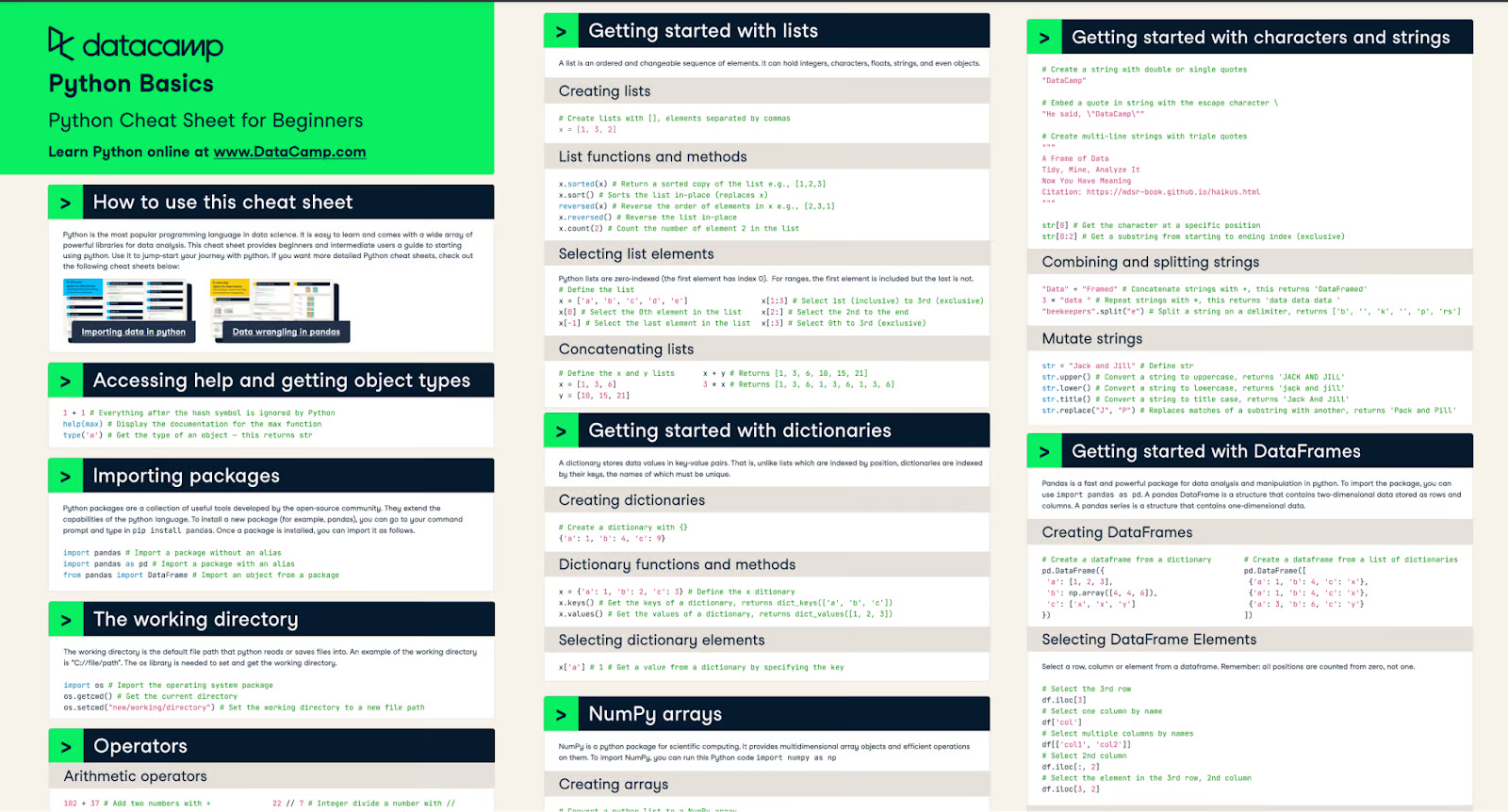
Tools like our Python Cheat Sheet for beginners can help you pass Python certifications.
The Value of Python Certifications
Is a Python certification worth it? Well, that depends on several factors. If the role you’re looking for requires a certification, then it makes sense to pursue the qualification and prove that you have the necessary skills. Similarly, it could be the difference that separates you from other candidates applying for the same jobs.
Here are some of the factors you should consider when weighing up the value of Python certifications:
- Skill validation. A Python certification provides a benchmark for skills. It offers a standardized way to prove one's expertise in Python to potential employers or clients.
- Career advancement. For professionals looking to advance in their careers or switch roles, a certification can provide an edge, making them stand out in a pool of applicants.
- Learning path. Pursuing a certification often provides a structured learning path, guiding individuals through various Python topics in a systematic manner.
- Networking. Some certification programs also offer membership to exclusive communities, allowing certified individuals to network with peers and industry experts.
However, while the allure of Python certifications is undeniable, it's essential to understand that they are just one piece of the puzzle.
In the tech world, where skills and practical application reign supreme, relying solely on certifications might not be the most strategic move. There are other avenues, like hands-on projects and real-world experience, that can offer equal, if not more, value.
Building a data science portfolio is often a great place to start, as it allows you to demonstrate a range of practical Python projects and skills.
Build your data portfolio
Showcase your skills and projects in minutes.

The Benefits of a Role-Based Certification
Traditional certifications, while valuable, often provide a broad overview of a language or tool. However, as the industry matures, there's a growing demand for role-specific expertise. This is where role-based certifications, like those offered by DataCamp, come into play.
Let’s take a look at some of the benefits that come with getting certified as a Pythonista:
- Tailored curriculum. Role-based certifications focus on the specific skills required for each role, like data analysis or engineering, making sure the content is directly relevant.
- Industry recognition. Developed with industry leaders, DataCamp's certifications align with the latest demands, giving employers confidence in your expertise.
- Practical application. Certifications emphasize real-world projects, ensuring practical skills alongside theoretical knowledge.
- Career alignment. Provides a clear path for roles like data scientist, data analyst, or data engineer.
- Better value. DataCamp’s certifications are available for free with a Premium subscription, making them more cost-effective compared to other options.
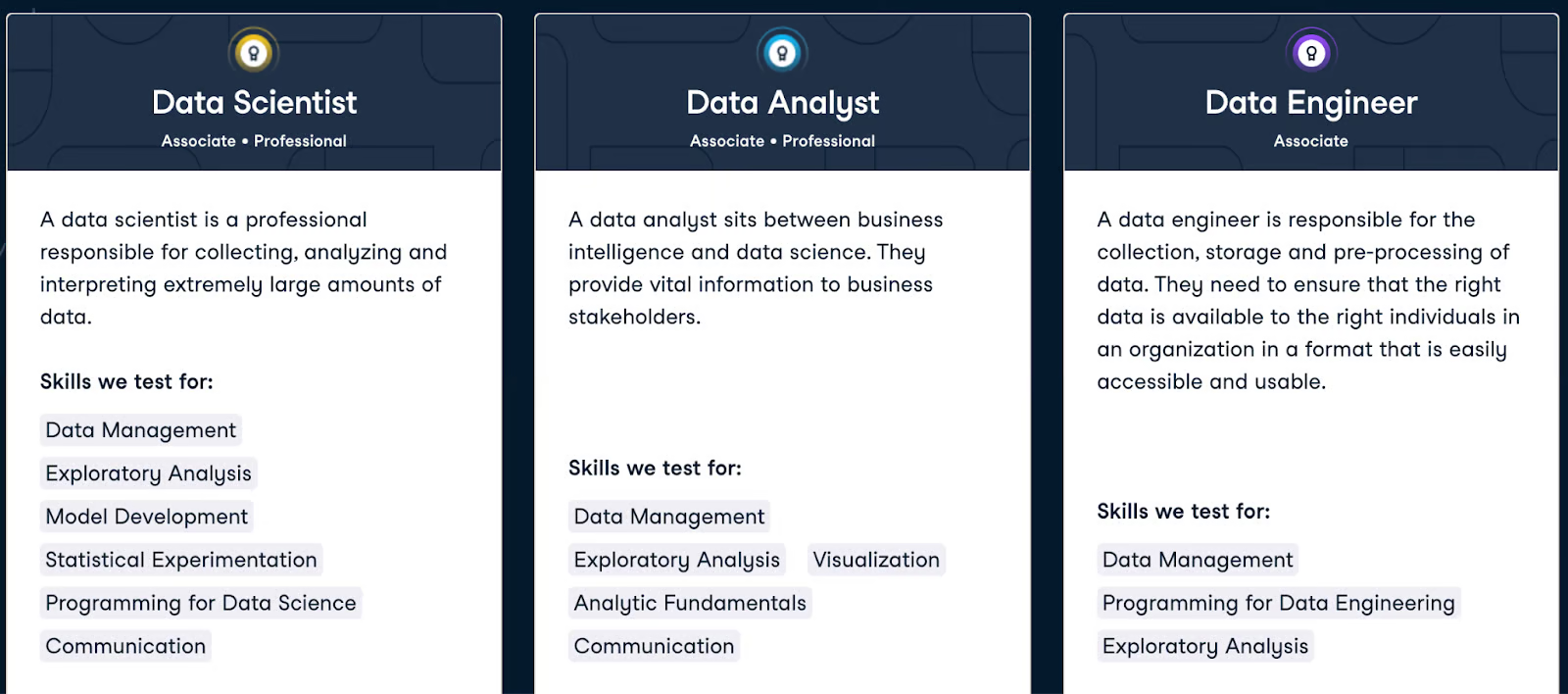
DataCamp’s Certifications
Prerequisites for Python Certifications
Before you take a Python certification, it’s important to have the right base knowledge. These prerequisites ensure that you have the foundational knowledge required to tackle the certification's content and ultimately succeed in the examination.
Here are some points to work on:
- Foundational knowledge of Python. Basic understanding of Python syntax, data types, and programming constructs.
- Hands-on experience. Time spent writing, debugging, and executing Python code.
- Understanding of core computer science concepts. Familiarity with algorithms, data structures, and object-oriented programming.
- Specialized knowledge. Knowledge related to specific tools, libraries, or domains relevant to the certification's focus.
- Prior certifications. Completion of foundational or intermediate certifications from the same institution, if required.
- Soft Skills and communication. Ability to communicate findings, collaborate with teams, and understand business contexts.
Many of these skills are available to learn through DataCamp resources, such as our Data Scientist with Python career track, which covers the skills you’ll need to kick-start your career.
Python Certification vs. Python Certificate
Often, people use the terms "certification" and "certificate" interchangeably. However, when it comes to Python and many other technical domains, there's a distinct difference between the two. Understanding this distinction is crucial for anyone looking to enhance their credentials and make informed decisions about their learning journey.
Python certification
- Definition. A Python certification is a formal recognition that attests to an individual's proficiency and expertise in the Python programming language. It's typically earned by passing a rigorous examination that tests the depth and breadth of one's knowledge in Python.
- Purpose. The primary goal of certification is to validate an individual's skills and knowledge in a specific domain. In this case, it's Python programming.
- Issued by. Certifications are usually issued by recognized institutions, organizations, or bodies that have authority in the field. Examples include DataCamp, the Python Institute, Microsoft, and other tech giants.
- Validity. Certifications often have a validity period, after which they might need to be renewed. This ensures that the certified individual remains updated with the latest advancements in the field.
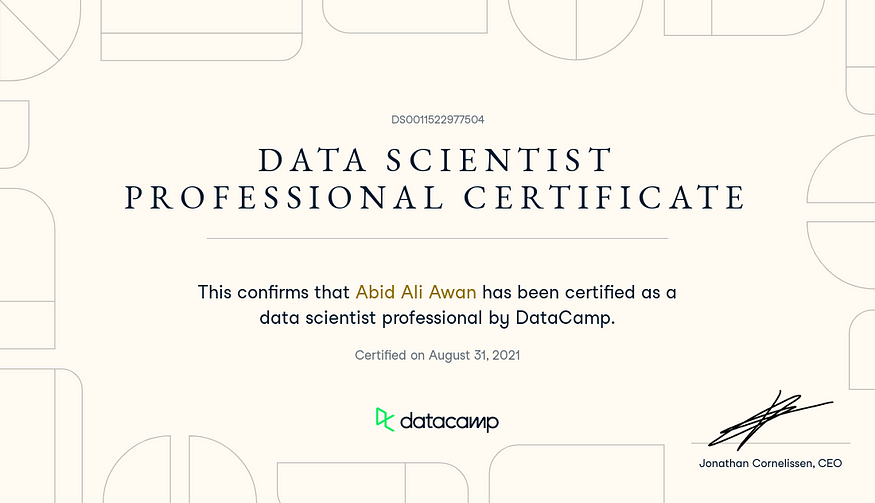
An example of DataCamp’s Python certification
Python certificate
- Definition. A Python certificate, on the other hand, is a document or digital badge that confirms an individual has completed a specific course or training program related to Python. It signifies the completion of a learning journey rather than the validation of expertise.
- Purpose. The primary goal of a certificate is to acknowledge that an individual has been exposed to and has undergone training in specific Python topics.
- Issued by. Certificates can be issued by a wide range of providers, including universities, online platforms, and even individual instructors offering Python courses.
- Validity. Unlike certifications, certificates usually don't have an expiration date. They are a testament to the fact that an individual undertook and completed a course at a particular point in time.
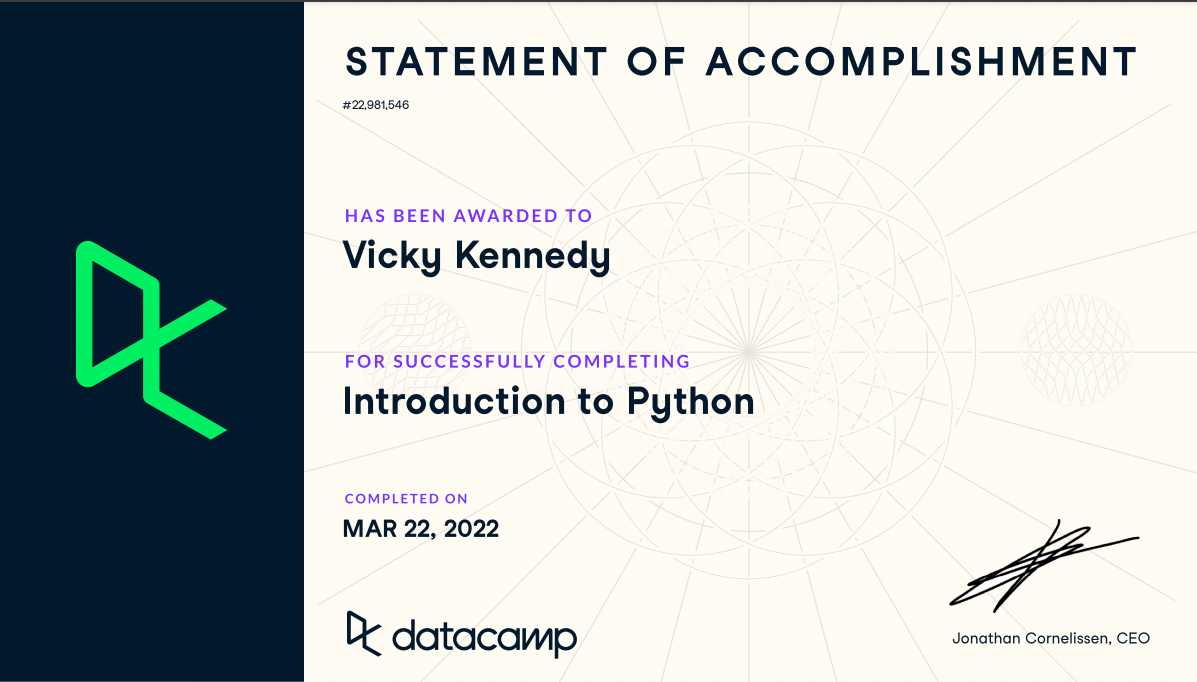
An example of a DataCamp Python certificate - different from a certification
Comparison
|
Criteria |
Python Certification |
Python Certificate |
|
Definition |
A formal recognition that attests to an individual's proficiency and expertise in the Python programming language. |
A document or digital badge confirming an individual has completed a specific course or training program related to Python. |
|
Purpose |
To validate an individual's skills and knowledge in Python programming. |
To acknowledge that an individual has undergone training in specific Python topics. |
|
Issued By |
Recognized institutions, organizations, or bodies with authority in the field, e.g., Python Institute, DataCamp, Microsoft. |
A wide range of providers, including universities, online platforms, and individual instructors offering Python courses. |
|
Validity |
Often have a validity period and might need renewal to ensure the individual remains updated with the latest advancements. |
Usually don't have an expiration date. They signify that an individual completed a course at a particular point in time. |
Final Thoughts
Python proficiency is both challenging and rewarding, and Python certifications offer a structured way to validate your skills. While these certifications can enhance a resume, the real value lies in the knowledge gained and its practical application. Role-based certifications, like those from DataCamp, can also cater to specific industry needs, focusing on specialized skills.
Whether you’re starting out or looking to advance, the right certification, such as the Python Data Associate certification, can be a key step in your Python journey. Make sure to choose a path that aligns with your career goals and learning style. If you're interested in role-based learning, consider exploring our other Certification programs.
Get certified in your dream Data Analyst role
Our certification programs help you stand out and prove your skills are job-ready to potential employers.
FAQs
Can a Python certification help me get a job?
A Python certification can make your CV stand out and prove your skills are job-ready to employers. However, it's also important to complement certifications with practical experience and a strong portfolio.
How much do Python certifications cost?
The cost varies depending on the certification and the issuing organization. Some can be around $70 for entry-level certifications, while more advanced certifications may cost several hundred dollars.
Is hands-on experience as valuable as a certification?
Hands-on experience, especially demonstrated through projects and a portfolio, is extremely valuable and often considered on par with, if not more important than, certifications by many employers.
How long does it take to complete a Python certification?
While the actual certification exam may take no more than a few hours, it's the preparation for the exam that takes time. For an entry-level Python certification, you may be able to build an appropriate base-level knowlegde over the course of a few weeks or months. For more advanced certifications, it may take many months or years to build the required knowledge and experience, as well as passing any pre-requisite certifications.
How can I stay motivated while studying for a Python certification?
Setting clear goals, maintaining a study schedule, joining a study group, and applying what you learn through small projects can help keep motivation high. Celebrating small achievements along the way can also boost your motivation. Remember, learning Python is a journey, but an incredibly rewarding journey!
What if I fail a Python certification exam? Can I retake it?
Yes, most certification programs allow you to retake the exam if you fail. There is typically a waiting period and there may be an additional fee. For DataCamp's certifications, you have two opportunities to pass the exam(s) and practical exam. If you're not able to pass the exams, you'll have to wait 14 days before registering again.
What other certifications should I consider?
There are many certifications covering different technologies and career paths. Check out some of our other guides for an overview:


